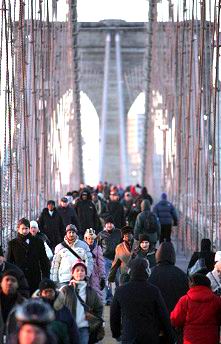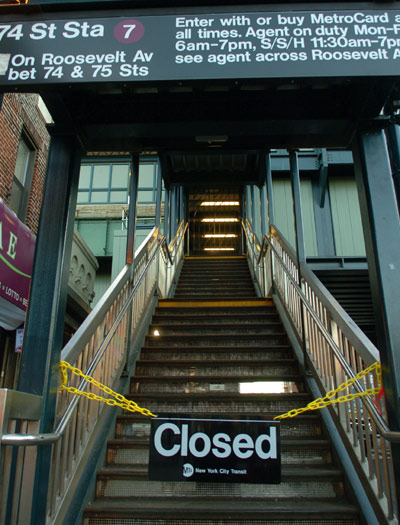
Comnmuters walk across the Brooklyn Bridge early yesterday in New
York. (Photo: Xinhua/Reuters)

A sign reading 'closed' hangs on chained entrance way of
an upper eastside subway station in New York
yesterday. -Xinhua
New York's Transport Workers Union (TWU) announced in New
York yesterday the start of a citywide transit strike that shut down the
largest transit system in the United States after a breakdown in negotiations
with the Metropolitan Transportation Authority (MTA).
After five days of intensive contract talks between the MTA and the TWU, MTA
spokesman Tom Kelly told a press conference that the TWU negotiators had
rejected what he described as a "fair" final offer by the MTA, and departed for
the union's headquarters to vote on a work stoppage that would strand many of
the city's 7 million commuters.
The negotiations broke down after continuing for nearly two hours past the 9
p.m. deadline that the TWU had set the MTA to present its final offer. Earlier,
TWU officials asked the MTA to present its best offer at 9 p.m. so that the TWU
executive board could vote on it before midnight.
It was learned that the MTA raised its wage increase from 3 percent for three
years to 3 percent in the first year, 4 percent in the second and 3.5 in the
third.
TWU President Roger Toussaint said on Monday that the union would agree to
lower its wage demands to a 6 percent increase for each year of the three-year
contract if the MTA agrees to make security improvements.
He maintained that trains and buses will come to a halt as of 12:01 a.m.
Tuesday unless there is a substantial effort in contract negotiations made by
the MTA before then.
The two sides had been engaged in intensive negotiations since last week and
failed to narrow down their differences over terms of a new contract. The
sticking point of the talks was wages and pension.
A citywide bus and subway strike would be New York's first since an 11-day
walkout in 1980. City officials say a full-fledged transit strike would
debilitate the city and cost billions of dollars.



